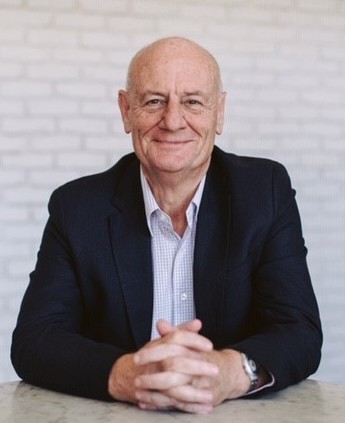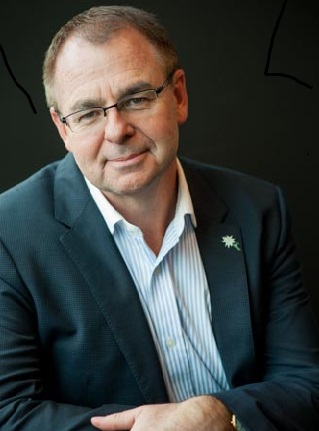CCA Annual Report 2021
Chair Report

When I last presented a CCA Chair’s report mid-way through 2021, we thought we were almost through the COVID-19 pandemic. We were in the planning stages of winding back the Charities Crisis Cabinet which had been such a pivotal part of the CCA response to COVID. We thought it was time to reframe our policy platforms for the charities sector in a different way.
The reality is that COVID continued to dominate the agenda for CCA throughout 2021.
Another factor we expected to play out in 2021 was the looming election campaign. At the time people were talking about the government going to election early in November. In hindsight, this might have been a better option for the government, but it missed that opportunity.
Throughout 2021 and even within the last two weeks, I have continued to co-chair the Charities Crisis Cabinet with Susan Pascoe. Through this forum, we have continued to bring together some outstanding leaders from across the charities sector to share information, test ideas and advocate for policies that would enhance the work of charities.
I want to put on the record my appreciation for all the time and energy Susan and the members of the Charities Crisis Cabinet have contributed over the last couple of years. I think that the Charities Crisis Cabinet has been one of the more important and successful advocacy groups driving support for charities through this challenging period.
With David Crosbie as the Charities Crisis Cabinet Secretary, Deborah Smith doing so much of the work behind the scenes, we were collectively able to advance the need for charities to be factored into a broad range of COVID-19 policy responses. We didn’t always get the outcomes we were seeking, but we did have some success, and at least made sure there was advocacy for our shared policy positions.
While CCA and the Charities Crisis Cabinet played critical advocacy and catalysing roles, it is also important to acknowledge the broader response of the charities sector to the pandemic. I think the way charities managed to persist and find innovative ways to offer services is testimony to the strength of leadership in many Australian charities. Despite all the challenges, it has been quite uplifting to see so many charities demonstrating their true value throughout 2021.
And speaking of leadership across our sector, I want to again acknowledge my fellow CCA Board Directors all bringing a wealth of experience and knowledge to our regular Board discussions. CCA Board meetings are focused on strategy and how best to achieve a shared vision. I enjoy these discussions and I always learn more from my fellow directors.
I would like to especially acknowledge three CCA supporters and former Board Directors. Jody Wright has faced some difficult challenges with the death of her husband from cancer over the past 12 months. She has stepped down from CCA, but I want to formally acknowledge her important contribution to many CCA Board discussions and offer her our collective condolences.
Conny Lenneberg has also stepped down from her Board role to enable her to focus on her own battle with cancer. We really miss Conny’s knowledge and wise counsel on the CCA Board, and on the Charities Crisis Cabinet, but we all hope she will be able to make a full recovery.
Kristy Muir has moved on from the Centre for Social Impact to a new and exciting role at the Paul Ramsay Foundation, and while she continues with the Charities Crisis Cabinet, we will miss her invaluable input into CCA Board deliberations.
While I am acknowledging people who make the work of CCA possible, there are two other supporters who have been very important in enabling CCA to continue to be effective. Two years ago, Cat Fay at Perpetual had agreed in principle to support our initial work on developing a blueprint for the charities sector. She has been very adaptable in allowing CCA to put Perpetual funding towards our COVID response, including the work of the Charities Crisis Cabinet. It is this kind of flexible philanthropic support that can be so critical to organisations like CCA and we thank Cat and the Perpetual Foundation for the generous support.
Sean Barrett at Origin Foundation has also been a strong supporter of CCA over many years. We are all a little envious knowing that he has moved to Tasmania to pursue his passion for wooden boat building, but we look forward to continuing to work with the Origin Foundation and the new CEO Sam Sayers.
As I have said before, our staff are our primary resource. David Crosbie and Deborah Smith not only do outstanding work, but they are also clearly driven by the purpose of CCA and the goals we share. They were able to produce an amazing amount of work for such a small secretariat as is evidenced in the listing of activities in this Annual Report.
At CCA we know our real strength is our members. Without members and their financial contributions, we would not exist. Without members, our policy and advocacy would be not much more than opinion. On behalf of our staff and the Board, I want to thank every CCA member for helping us make a difference.
We are now facing a new government, new challenges, and still dealing with the fallout of a global pandemic. There is clearly a lot of work for CCA to focus on this year and we will again be asking you to get involved and support our work.
I thank you all for being part of CCA. I hope you feel we have repaid your investment in us, and I look forward to working with you in 2022 as we strive to better serve our communities and work towards the kind of Australia we want to live in.
Rev Tim Costello AO
Chair, Community Council for Australia
CEO Report

Like many in the charities sector, CCA had to take on a whole new range of tasks and activities in 2021. While some of the adaptations we made were quite successful, we still struggled as COVID seemed to drag on. CCA is about bringing people together, developing shared ideas and working towards achieving the agreed outcomes. While we did our best to pivot online for a lot of our work, we also missed meeting face to face with our members and advocating directly with decision makers.
Our experience was that in the second year of the pandemic, CCA was not able to achieve the same level of engagement from government officials and policy makers as we did in 2020. This experience of a more restricted engagement from government and others appeared to be shared across the charities sector.
At the same time, CCA was very successful in increasing our online engagement with the sector. Not only did we have the Charities Crisis Cabinet and CEO Forums, but also new and more regular forums bringing together Digital Leadership from the Sector, Chief Financial Officers, Policy and Government Relations Managers, and Staff and Human Relations Managers.
A broad range of issues that are important to our members emerged through these forums ranging from working with the Fair Work Ombudsman around oversight of wages and conditions to seeking out options for more affordable and accessible insurance coverage.
CCA also supported the work of Philanthropy Australia in developing the new plan to double giving in Australia by 2030, and with Infoxchange in developing the ground-breaking Digital Transformation Hub. We were part of the discussion about disaster readiness in Australia and the role of charities and volunteers.
At times the online forums and meetings convened by CCA in 2021 were important not just for the discussion of issues, but also in offering peer support to many charity sector leaders struggling to deal with their challenges. I know from talking with our members that having others in a similar situation talk through both how they are feeling as well as how they are responding helped many find a way forward with renewed focus.
CCA also continued to maintain good relationships with key decision makers whether through our engagement in opportunities like Senate Estimates or policy development discussions with Members of Parliament, Senators and their advisors. Many of these were online. We also continued to be part of consultative mechanisms with the ATO and Treasury.
As Tim Costello has highlighted, the Charities Crisis Cabinet and CCA advocacy did not always achieve the policy we might have wanted in 2021, but we persisted and had quite a few successes behind the scenes in changing legislation, regulations and other proposed policy initiatives.
I think the listing of CCA activities covered in this Annual Report is a good indication of the breadth of activities we engaged in throughout 2021.
The fallout of dealing with a global pandemic will be a key factor as we move forward. The impact of a higher cost of living, higher government debt levels and a very tight labour market will be with us for some time. Volunteering has not returned to pre-pandemic levels and competition for funding from philanthropy and governments is only increasing.
We know there are a wide range of issues that charities will have to deal with, and the role of CCA will continue to be very important over the coming 12 months. CCA will need your support if we are to remain an effective advocate for our sector.
As I have noted many times, I feel privileged to work at CCA, it is a wonderful, if at times demanding, role. To work with people like Tim Costello, Claire Robbs our Deputy Chair, Susan Pascoe, and the CCA Board is a genuine pleasure. CCA is fortunate to have some of the best strategic thinkers in our sector on our Board and the regular meetings of the Charities Crisis Cabinet were both productive and enjoyable throughout 2021. There is a real sense of colleagues sharing challenges and all working together towards better serving our communities. What makes all this even more remarkable is that people like Tim and Susan are tireless volunteers giving freely of their time and insight when there are so many other things they could be doing.
While acknowledging outstanding people for their contribution to CCA, it would be remiss of me not to acknowledge and offer my thanks to the wonderful Deborah Smith who actually runs CCA behind the scenes. I sometimes feel like a leave a mess all over the place as we strive to keep many balls in the air and drive real change, but Deb is fantastic at catching the balls I miss and ensuring we are attending to our priority tasks and issues.
I know Tim Costello has thanked some of our key supporters and departing Board Directors, but I want to make special mention of Cat Fay and Sean Barrett who have backed CCA in ways that have enabled us to better serve our members and our mission.
I talk to many people from across the charities sector in my role, often just a chat about issues or a more in-depth discussion about strategy. I rely on so many people who are not named in this report to offer me advice and wise counsel. Most of these supporters are part of our membership and it always reminds me that CCA is not about the staff, the Board, or any of our individual initiatives, CCA is primarily about our members and the work they do. So to all our members I offer my thanks for your support in 2021.
I look forward to again working alongside you all as we seek to make Australia a better place in 2022 and beyond.
David Crosbie
CEO, Community Council for Australia
Policy and Advocacy
CCA was founded by leaders in our sector to build flourishing communities by enhancing the extraordinary work of Australia’s charities and not for profit sector. Thank you to our members and our partners for your involvement, contributions and support throughout 2021.
Ongoing crisis
|
Charities large and small are a critical part of Australia’s economic and social infrastructure, especially in times of emergency or crisis. Government recognised this role in some of the measures put in place during the COVID-19 pandemic, and we welcome this recognition. As you frame policies in critical areas including vaccine roll out and beyond, charities are keen and ready to be included in policy discussions and to contribute to the development and design of new initiatives. Charities and not-for-profits want to be part of the solution, part of rebuilding our communities and boosting our economy. Charities Crisis Cabinet Letter to All Australian Governments |
Any cautious hope and optimism for a 2021 of recovery and renewal were soon dashed as charities, their staff and their volunteers were squeezed, exhausted and again at the frontline of supporting their communities through uncertain and difficult times.
The Charities Crisis Cabinet (CCC) continued to meet – pushing both the need for crisis support, and the opportunity to better support our communities through crisis and into recovery by working better with the charities and NFP sector. Our thanks to co-Chairs Adj Prof Susan Pascoe AM and Rev Tim Costello AO and the members of the CCC for their ongoing dedication and commitment to our sector.
Media Release and Pro Bono News: NSW offers support to charities – but much more is needed, 2 September
Charities Crisis Cabinet Letter to Prime Minister and National Cabinet, 27 July
The six changes charities want to support communities in lockdown, Pro Bono News, 29 July
Charities demand urgent lockdown supports, Canberra Times (and many regionals), 27 July.
Fixfundraising – get rid of time-wasting ineffectual bureaucracy
|
‘ ‘Based on this research, the Queensland government should immediately dismantle its charity fundraising bureaucracy. It is the worst in the country. The Queensland fundraising registration process is costing Australian charities the most time, administration, and money, even for charities that do not operate in Queensland. Victoria and WA are not far behind. If VIC and WA were to disband their charity registration process, it would save thousands of charities a lot of time, administration and money without increasing the risk to donors. The ACT, SA and Tasmania may be trying to make things a little easier, but they still have a long way to go in reducing complexity, time and costs for charities. The NT has shown the way by encouraging charities to fundraise while relying on the application of existing consumer law (ACL) and the ongoing oversight of the national charities regulator (ACNC). Apparently, the sky is still up there in the NT and it would not fall in on the other jurisdictions if they did the same. David Crosbie, CCA CEO |
CCA, the Fixfundraising coalition and Charities Crisis Cabinet continued the push for meaningful action to reform Australia’s disparate, dysfunctional and out of date system of fundraising regulation.
The May release of independent research of 600 charities ranked the performance of each state and territory and illustrated the waste and woeful ineffectiveness of the current system, finding:
1. The majority of charities use online fundraising. Online fundraising requires consideration of seven different state and territory registration systems and compliance regimes even if they are only a local charity.
2. 57% to 88% of charities and NFPs report that the fundraising registration process is either very complex with a lot of excessive information required, or ‘somewhat complex’.
3. The average wasted financial cost for each charity to register / comply is in excess of $10,000.
4. 39% of Australia’s charities and NFPs are not aware of the need to comply with different state and territory licenses and regulations when raising funds online.

Media Release: Get rid of time-wasting ineffectual bureaucracy!
Fundraising Survey 2021, Piazza Research
Survey results were sent to all politicians (Federal, State and Territory) and media. Tim Costello, David Crosbie, Sue Woodward (Justice Connect) and Peter Hills-Jones (PFRA) conducted over 30 metro and regional interviews with press and radio.
Is red tape strangling the sector? F&P Magazine, 28 May: CEO David Crosbie says, ‘Right now, charities are being completely buried in red tape when the reality is they need to make the best use of every single dollar they can raise. The solutions are clear. Either states and territories should drop their fundraising regulations altogether and rely on the Australian Consumer Law (as the NT does), or if they are going to insist on each having their own regulations, they need to draw on all the existing data held by the charities regulator and be entirely consistent – the same – across all jurisdictions.’
Australian charities drowning in red tape, survey shows, Third Sector, 27 May: ‘The real costs of government red tape have become enormous for charities. In many cases it is stopping them from doing their job. Millions and millions of dollars are being wasted as charities try to meet regulations.’
Fundraising regulations are ‘stopping charities from doing their job’, Pro Bono News, 27 May: ‘Mllions of dollars were being wasted as charities seek to meet “ridiculous regulations” that are not even enforced. The current dog’s breakfast of state and territory fundraising regulations need to be completely scrapped. This was one of the key recommendations from the latest Senate Enquiry and the Bushfire Royal Commission.’
An Election year ahead. Ready, set…
CCA worked with sector champions within the Labor party towards the inclusion of a positive agenda for our sector within the ALP National Policy Platform in the lead up to the 2022 election year. We would particularly like to acknowledge and thank Former Senator Dr Ursula King who spoke to the policy recommendations at the ALP National Conference.
ALP National Platform – Civil Society (from page 115)
ALP pledges support for 10-point plan to strengthen the charities sector, Pro Bono News, 1 April.
CEO David Crosbie told Pro Bono News the policy commitment was a “game changer”. “The measures outlined in their 10-point plan are all measures CCA has actively supported and advocated for. This new ALP set of policies for the sector will make the next election more interesting, with the current government now needing to show it is also committed to strengthening the sector as part of its core policy agenda.”
CCA commissioned an independent survey of community attitudes towards charities in 20 marginal seats to put voter attitudes towards the importance and contribution of the charities sector on the agenda with major political parties and candidates during the 2022 Election. To be released during the Election campaign.



 Australia has some of the strongest protections for charities to advance their purpose through advocacy, thanks largely to our work together to ensure these protections were written into our Charities ACT 2013.
Australia has some of the strongest protections for charities to advance their purpose through advocacy, thanks largely to our work together to ensure these protections were written into our Charities ACT 2013.











